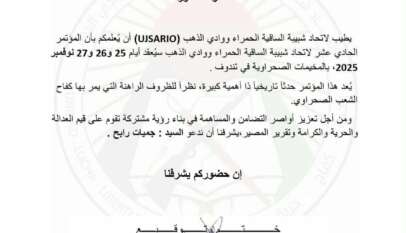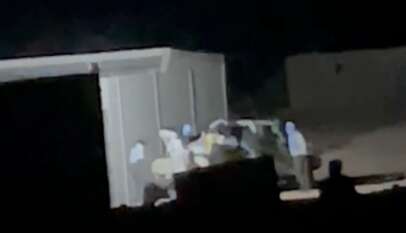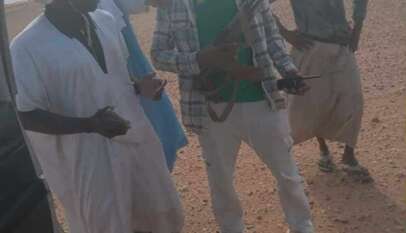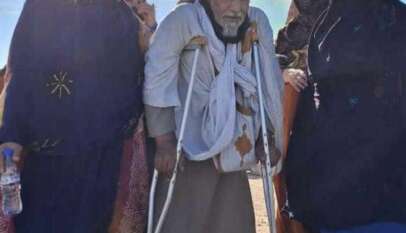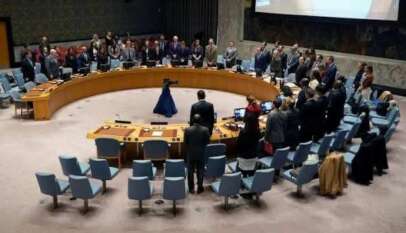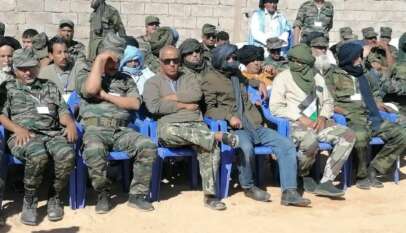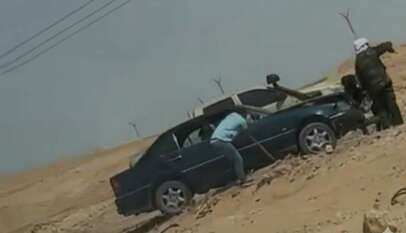Document – Supporter of autonomy plan should not face retaliation in the Tindouf camps in Algeria
AMNESTY INTERNATIONAL
PUBLIC STATEMENT
AI Index: MDE 03/002/2010
23 September 2010
Supporter of autonomy plan should not face retaliation in the Tindouf camps in Algeria
 In a letter sent yesterday, Amnesty International called on the Polisario Front to reveal the legal status and whereabouts of Mostafa Salma Sidi Mouloud, who was arrested on the evening of 21 September following his visit to Western Sahara, a territory annexed by Morocco in 1975. The organization fears that he might be held solely on account of his publicly expressed views in favour of the autonomy of Western Sahara under Moroccan administration.
In a letter sent yesterday, Amnesty International called on the Polisario Front to reveal the legal status and whereabouts of Mostafa Salma Sidi Mouloud, who was arrested on the evening of 21 September following his visit to Western Sahara, a territory annexed by Morocco in 1975. The organization fears that he might be held solely on account of his publicly expressed views in favour of the autonomy of Western Sahara under Moroccan administration.
According to a statement by Maghreb Agence Presse, the official Moroccan news agency, Mostafa Salma Sidi Mouloud was arrested at the border-post leading to the Tindouf camps in the region of Mhiriz.
His brother, Mohamed Sheikh Sidi Mouloud, told Amnesty International that his relatives do not know where he is being detained; however, they were verbally informed by members of the Polisario Front that Mostafa Salma Sidi Mouloud will be referred to trial before a military court after 12 days.On 9 August 2010, Mostafa Salma Sidi Mouloud, a Polisario Front police officer, announced in a press conference in Smara, Western Sahara, his support for the autonomy of the region under Moroccan rule. Shortly prior to his arrest, he made public his intention to further promote the Moroccan autonomy plan to the Sahrawi refugees living in the Tindouf camps, which are administered by the Polisario Front. The Polisario Front calls for the independence of Western Sahara and runs a self-declared government in exile, the Sahrawi Arab Democratic Republic (SADR).
On 22 September, the Sahara Press Service (Servicio de Prensa Saharaui, SPS) quoted official sources within the Polisario Front acknowledging the arrest of Mostafa Salma Sidi Mouloud for “spying for the enemy”. The statement went on to say that Mostafa Salma Sidi Mouloud had “divulged secrets” with the aim of undermining the safety and security of the SADR. According to the latest version of the Penal Code of the SADR available to Amnesty International, dating from 1996, penalties for various acts of “treason” are punishable by prison terms of between five and fifteen years, while the divulgation of “secrets” is punishable with imprisonment of between five and 10 years.
The statement also implied that Mostafa Salam Sidi Mouloud’s action of “treason” presents a particularly grave “moral and legal” mistake in view of the Polisario’s Front state of war with Morocco. A ceasefire between the Polisario Front and Morocco has been in place since 1991.
In the letter addressed to Mohamed Abdelaziz, the President of the SADR and the Secretary General of the Polisario Front, Amnesty International urged him to ensure that Mostafa Salma Sidi Mouloud is protected from arbitrary detention or any other retaliatory measures due to his public stance in support of the autonomy of Western Sahara under Moroccan sovereignty. Amnesty International believes that peaceful support for the autonomy of Western Sahara should not be perceived as an act to undermine the security of SADR and justify restrictions to the right to freedom of expression. Mostafa Salma Sidi Mouloud should be released unless he is charged with recognizably criminal offences, and should further be provided with immediate access to a lawyer, his family and any medical attention he might require.
In its letter, Amnesty International added that it would consider Mostafa Salma Sidi Mouloud a prisoner of conscience if he is indeed held solely on the basis of his views on the autonomy of Western Sahara.
The SADR committed to respect the right of any individual to “disseminate and express his opinions within the law”, when it ratified the African Charter for Human and People’s Rights in 1986.
Background
The Algerian government, as the country hosting the Sahrawi refugee camps in Tindouf, also has an obligation to ensure that the right to freedom of expression is respected within its territory. Despite this, the Algerian authorities prevented two Moroccan journalistsfrom the Sahara Ousbouiyaweekly, Lahcen Tigbadar and Mohamed Slimani, from covering the return of Mostafa Salma Sidi Mouloud to the Tindouf camps. Mohamed Slimani told Amnesty International that upon their arrival to the Oasis Hotel in the city of Tindouf, they were interrogated by Algerian security officials and kept under close surveillance until their expulsion from Algeria on 22 September.
Seven Sahrawi activists from Western Sahara, who returned from the Tindouf camps to Casablanca in October 2009, are facing charges of undermining the external and internal security of Morocco, including attacking its “territorial integrity” in reference to the status of Western Sahara. Amnesty International considers three of the activists currently detained in Salé Prison to be prisoners of conscience detained solely for the peaceful and legitimate exercise of their rights to freedom of expression, association and assembly, including their public support of self-determination.
On numerous occasions, Amnesty International has called on the UN Security Council to include a human rights monitoring component in the mandate of the United Nations Mission for the Referendum in Western Sahara (MINURSO), deployed in September 1991. Amnesty International believes that the inclusion of a human rights monitoring mechanism in the mandate of MINURSO looking at both Western Sahara and the Tindouf refugee camps will deflate mutual accusations of human rights violations by providing equally impartial and independent reporting on the current human rights situation and will improve the situation of the populations affected.An independent mechanism is particularly important given that both sides to the conflict accuse the other of serious human rights violations and of exploiting human rights concerns for their respective political ends.
Public Document
For more information please call Amnesty International’s press office in London, UK, on +44 20 7413 5566 or email: press@amnesty.org
International Secretariat, Amnesty International, 1 Easton St., London WC1X 0DW, UK
www.amnesty.org
مؤتمر اتحاد الشبيبة : البوليساريو تستغل الوفود الأجنبية لطمأنة ورفع معنويات أتباعها بمخيمات تندوف وسط تنامي الاهتمام بمبادرة الحكم الذاتي بين الساكنة
تستعد جبهة البوليساريو لعقد المؤتمر الحادي عشر لاتحاد شبيبة الساقية الحمراء ووادي الذهب بم…

